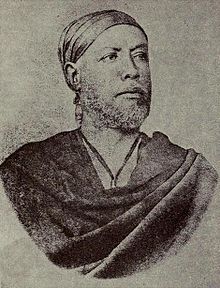Darge Sahle Selassie
| Ras Darge Sahle Selassie | |
|---|---|
 |
|
| Born | 1830 |
| Died | 23 March 1900, Salale |
| Father | Negus Sahle Selassie of Shewa |
| Mother | Woizero Wurige |
| Religion | Ethiopian Orthodox |
Ras Darge Sahle Selassie (1830 – 23 March 1900) was an Ethiopian prince. He was the son of Negus Sahle Selassie of Shewa and half-brother to Negus Haile Melekot, and the uncle of Emperor Menelik II of Ethiopia.
Captured by Emperor Tewodros II during that Emperor's reincorporation of Shewa into the Ethiopian Empire in 1855, Darge and his nephew Menelik (then called Sahle Maryam) were the chief Shewan prisoners taken with the Emperor to Gondar, and later the mountain citadel at Magdala (the modern Amba Mariam). Abeto Darge as he was then called, had been among the Shewan leaders that had tried to rally the resistance against the Emperor in the name of the young prince his nephew, and Tewodros had admired Darge's efforts. Although technically prisoners, the two Shewan princes enjoyed the Emperor's affection and favor, and were greatly honored and respected at his court. Darge was especially admired for his military skills. When Emperor Tewodros eventually decided to marry his daughter Alitash Tewodros to Menelik, Darge (now titled a Fitawrari) presided as the family elder of the Shewan Royal House.
Darge was part of the Shewan party that helped Menelik escape from Magdala in order to return to Shewa and reclaim his throne, but he himself remained behind. Darge was not punished by Tewodros for helping Menelik escape, and this was attributed to the deep affection Tewodros II had for Darge. He was released from captivity in 1868 by the British. Darge was created a Ras and made Ras of Selale by his nephew upon his return to Shewa following his release from Magdala when Tewodros II died, founding the senior cadet branch of the dynasty in the later days of the Ethiopian Empire. In 1886, then Emperor Menelik assigned him the governorship of Arsi Province, and completed the conquest that his nephew had begun the year before. The conquest was infamous for its slaughter of the Arsi Oromo who lived there, leading Baxter to describe him as "the Butcher Cumberland of the Arussi Highlands... whose name is still reviled there."
...
Wikipedia
